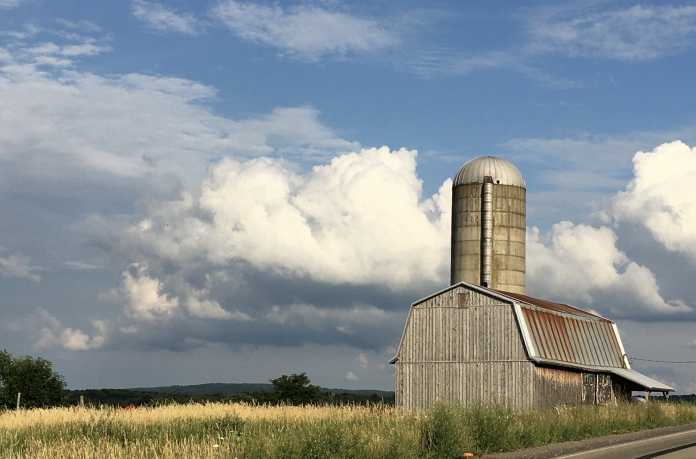Among the top Google News search results today for “climate change,” Google News is promoting a story in the Auburn, New York newspaper, The Citizen, titled, “Eco Talk: How climate change is affecting local farms.” The article asserts that farmers are having to adjust their practices in response to increasing extreme weather events like droughts and heat waves caused by human climate change. Objective data, however, show the exact opposite is the case. Not only is there no evidence that droughts or heatwaves have increased in recent decades, but the production of New York’s major agricultural products have significantly increased even as the land devoted to livestock and crops has declined.
Fortunately for New York farmers, neither heatwaves nor droughts have increased in recent decades as the Earth modestly warms.
Data from the United States Drought Monitor show no significant increase in the severity or length of droughts in New York state since 2000. In the modern period, since the 1800’s, New York’s most prolonged drought occurred between 1954 and 1966, during which time New York experienced 93 months with less than 2 inches of rain in a month. 1965 was the only year in which New York experienced less than 30 inches of precipitation—26.09 inches, approximately 20 inches less than the long-term average. These records were set at a time when global temperatures were declining, leading some scientists to warn we were headed towards the next ice age.
Data also show that New York’s closest month to experiencing no rain was in June 1949 when just 0.02 inches fell. Also, for New York’s top-10 driest three-month periods, only two occurred since 1990, and only one since 2000 – in 2001. Each of the top six driest three-month periods in New York state occurred before 1965, with the single driest three-month period being recorded in 1910.
Sorry, Citizen, but contrary to your report, droughts clearly have not become more frequent or severe in recent decades.
Nor has New York experienced longer heat waves or extreme heat than in the past. According to the National Weather Service, New York City’s longest heatwave, which consisted of 12 straight days of temperatures exceeding 90 degrees, was in 1953. New York state’s record high temperature of 108℉ was recorded in Troy, New York in 1926.
Concerning crop production, data from the U.S. Department of Agriculture (USDA) and the New York Farm Bureau (NYFB) show production has increased for most if not all of the major agricultural products produced in New York. The NYFB reports milk is New York’s top agricultural product, with New York ranking as the third-largest milk producing state in the United States. USDA data show overall New York milk production increased by more than 15 percent between 2000 and 2018, and the amount of milk produced per cow has increased by almost 29 percent.
Apples are New York’s fifth biggest agricultural crop, with the state being second largest apple producer in the nation. New York apple production increased more than 40 percent between 2000 and 2018.
New York is the second largest producer of Maple syrup. Maple syrup production in New York increased by almost 284 percent between 2000 and 2018.
New York is the third largest grape-producing state in the nation. Between 2000 and 2017 (the last year for which data are available), grape production increased by more than 21 percent.
Also, data show no increase in extreme weather in New York during the recent 150 years of modest warming.
In summary, New York’s farmers have increased yields, even as the amount of acreage devoted to farming and the number of farmers have declined substantially. That’s news Auburn’s The Citizen should be bragging about, not stoking alarm about.


















[…] on Climate Realism, here, here, here, here, here, here, here, here, here, here, here, here, here, and here, for example, […]
[…] Relax, Auburn Citizen, New York Farmers Are Enjoying a Climate Golden… […]
[…] Articles on Climate Realism, posted here, here, here, here, here, here, here, here, here, here, here, here, here, and here, for example, have shown fruit, grain, and staple crop production have all increased during the present period of warming, in developing and developed countries alike. […]